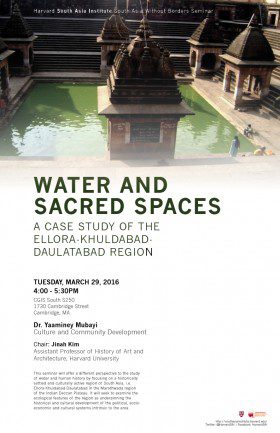South Asia Without Borders Seminar
Dr. Yaaminey Mubayi, Culture and Community Development
Chair: Jinah Kim, Assistant Professor of History of Art and Architecture, Harvard University
Water as an essential resource for the evolution of human settlements throughout history, has thus far escaped the attention of scholars of history in South Asia. Contemporary research relating to the subject largely involves the examination of policy frameworks governing access to and distribution of water resources on the one hand, as well as fixating on the colonial period as a “watershed” dividing pre-modern water management systems from colonial and post-colonial policies seeking to control the use of water by communities. Both perspectives view the actual element, its presence in nature and forms of access by human agency, in an instrumental manner, reducing it to “fit in” as it were, into pre-determined political and disciplinary frameworks and arguments.
This seminar will offer a different perspective to the study of water and human history. It will focus on a historically settled and culturally active region of South Asia, i.e. Ellora-Khuldabad-Daulatabad in the Marathwada region of the Indian Deccan Plateau. It will seek to examine the ecological features of the region as underpinning the historical and cultural development of the political, socio-economic and cultural systems intrinsic to the area. Ellora-Khuldabad-Daulatabad, lying within a 10 km radius in Aurangabad district, are richly populated by historic sites such as the Ellora Cave complex, a UNESCO World Heritage Site, Daulatabad Fort as also numerous smaller temples, pilgrimage centres, ashrams, Sufi dargahs and historic tanks (kunds). The theme for the region is set by the numerous water features, streams, rivulets, man-made reservoirs, temple tanks and historic state-sponsored waterworks. The micro-watershed of Khuldabad Taluka, within which the study area is located, provides an appropriate context for the evolution of human settlements in the region since pre-historic times.

